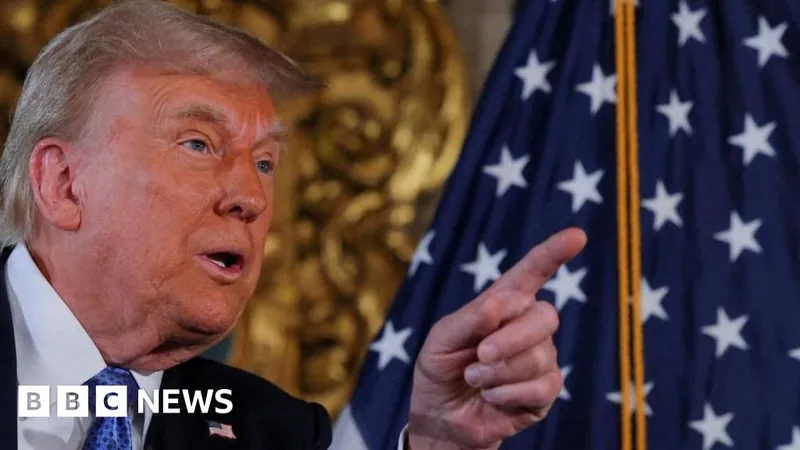
Trump's Government Shutdown Gamble Unveils the Cracks in His Power
2024-12-21
Author: Emily
The government shutdown standoff of December 2024 served as a significant litmus test for president-elect Donald Trump’s sway over the Republican Party in Congress. Unfortunately for Trump, this attempt revealed the fragility of his influence and control just as he prepares to return to the White House.
In a dramatic turn of events, Trump disrupted a bipartisan government funding bill with the unexpected support of billionaire entrepreneur Elon Musk, leading to further chaos in legislative circles. Just a day later, Trump pushed for a stripped-down government funding bill, coupled with a request to raise the federal debt ceiling — a proposal that raised eyebrows among many in Congress.
This demand came as a shock to staunch congressional conservatives who have long insisted that any hike in the debt limit should be offset by significant cuts to what they perceive as reckless government spending. The bill met fierce opposition from Democrats and even disillusioned Republicans who balked at Trump’s insistence.
In a turbulent vote, a coalition of 38 Republicans joined nearly all Democrats in rejecting the proposed legislation. This outcome signaled a considerable setback for the president-elect, who had vociferously endorsed the bill and warned Republican dissenters of potential political repercussions.
Facing this unexpected defeat, Republican leaders rushed to devise a new strategy. Their approach shifted to consider individual votes on various elements of the legislation, including funding for the government, disaster relief, healthcare adjustments, and raising the debt limit. However, the specter of deadlocked negotiations loomed large, particularly over the debt-limit increase.
After renewed discussions between Republican and Democratic leaders, they opted to reintroduce the original package sans the debt-limit provision. Though a contingent of 34 Republican fiscal conservatives remained opposed, all voting Democrats agreed to support the revised bill, driven by an urgent desire to avert a government shutdown just before the holiday season.
This cooperation ensured the legislation garnered the requisite two-thirds majority, paving the way for Senate approval and a signature from President Joe Biden.
In the backdrop of these negotiations, the Republicans clandestinely acknowledged the necessity to raise the debt limit without Democratic collaboration in the upcoming year. In this maneuver, they also agreed that any future increase would come hand-in-hand with substantial spending cuts across critical areas such as healthcare, veterans’ benefits, and food aid — measures that could ignite fierce opposition from Democrats and the American populace alike.
While this contentious issue may simmer for now, it illustrates the precarious balance the Republican Party must maintain as they move forward. Funding challenges will resurface again as the new budget deadline approaches in March, placing further strain on their already narrow majority in the House.
Ultimately, this latest episode emphasizes the delicate state of power within the Republican Party and the limitations facing Trump. Although he and Musk wield significant influence to derail legislation, mustering consistent support to fulfill ambitious policy proposals remains an uphill battle.
As the political landscape continues to evolve, one thing is clear: Trump’s ability to command his party is being tested like never before, suggesting a tumultuous road ahead.









 Brasil (PT)
Brasil (PT)
 Canada (EN)
Canada (EN)
 Chile (ES)
Chile (ES)
 España (ES)
España (ES)
 France (FR)
France (FR)
 Hong Kong (EN)
Hong Kong (EN)
 Italia (IT)
Italia (IT)
 日本 (JA)
日本 (JA)
 Magyarország (HU)
Magyarország (HU)
 Norge (NO)
Norge (NO)
 Polska (PL)
Polska (PL)
 Schweiz (DE)
Schweiz (DE)
 Singapore (EN)
Singapore (EN)
 Sverige (SV)
Sverige (SV)
 Suomi (FI)
Suomi (FI)
 Türkiye (TR)
Türkiye (TR)